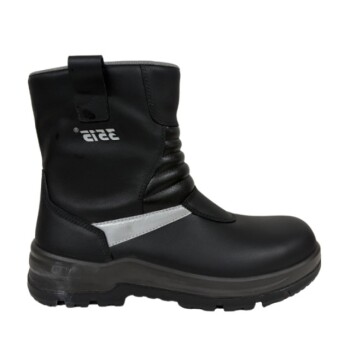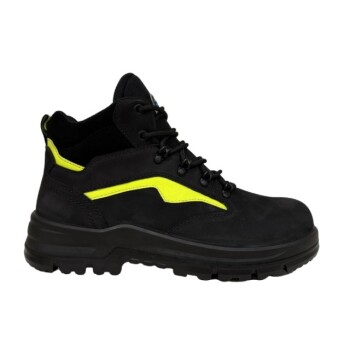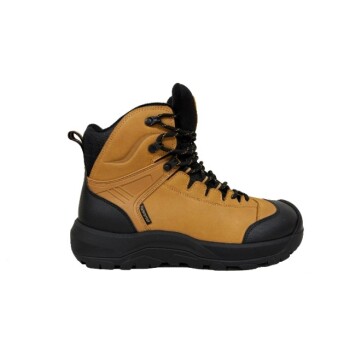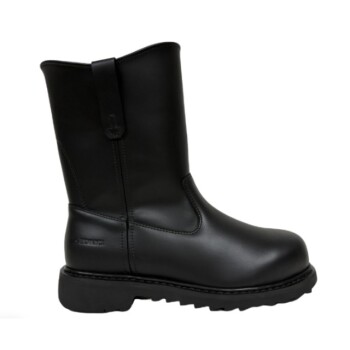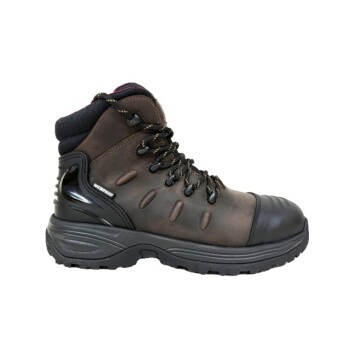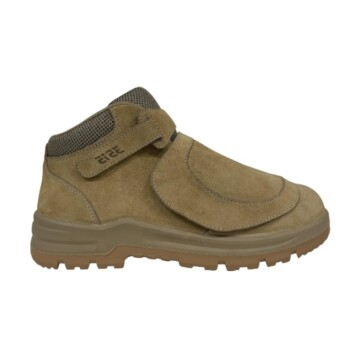The primary benefit of heavy-duty wellington boots is their exceptional protection against physical, chemical, and environmental hazards. They are engineered with features like steel toe caps, reinforced materials, and rugged soles for maximum safety and durability in demanding settings. However, this robust construction comes at the cost of increased weight, reduced breathability, and a higher price tag compared to standard models.
Choosing the right footwear isn't about finding the "best" boot, but about understanding the specific trade-offs between protection, comfort, and cost. Heavy-duty wellingtons prioritize absolute protection over all else, a decision that has significant implications for the wearer.
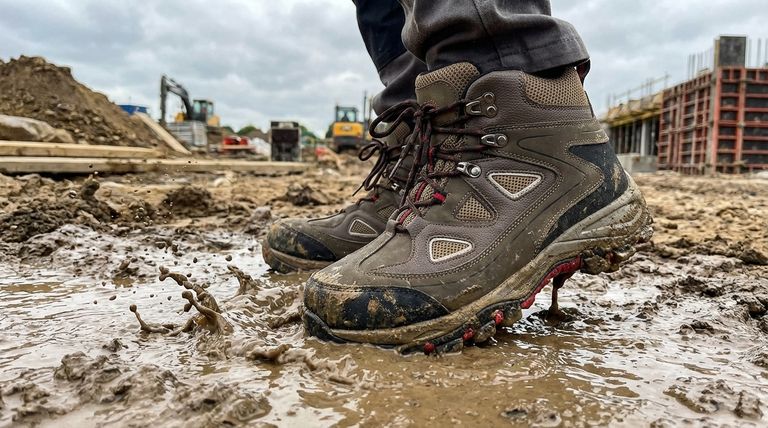
The Core Advantages of Heavy-Duty Design
Heavy-duty wellingtons are purpose-built for environments where standard footwear would fail. Their advantages stem directly from their specialized, reinforced construction.
Unmatched Environmental Protection
The most significant benefit is comprehensive protection. Their seamless, waterproof design is essential for working in wet, muddy, or flooded conditions.
Many models are also built from materials resistant to chemicals, oils, and other hazardous substances, making them mandatory in industries like agriculture, mining, and chemical processing.
Superior Physical Safety
Unlike standard wellies, heavy-duty versions often include critical safety features. A steel toe cap is common, protecting the foot from impact and compression injuries.
Additionally, many feature a puncture-resistant midsole to guard against sharp objects from below, a vital feature on construction sites or in waste management.
Enhanced Durability and Grip
These boots are made from thicker, reinforced materials like vulcanized rubber or specialized polymers. This results in a much longer lifespan under harsh, daily use compared to lightweight PVC boots.
The outsoles are also a key feature, designed with deep, aggressive lugs to provide superior grip and stability on slippery or uneven surfaces.
Understanding the Inherent Trade-offs
The features that make heavy-duty wellingtons so protective also introduce several necessary compromises that a user must consider.
Weight and Potential Fatigue
The steel components, thicker materials, and rugged soles add significant weight. While manageable for short periods, this extra weight can lead to fatigue over a long workday, a stark contrast to lightweight tactical boots designed for agility.
Comfort and Breathability Issues
The same waterproof materials that keep moisture out also trap sweat and heat inside. This lack of breathability can lead to significant discomfort, especially in warm weather.
While some models have lining, they are generally less comfortable for all-day wear than boots designed specifically for comfort, such as tactical boots which are easier to break in.
Temperature Regulation
Heavy-duty wellingtons offer very little natural insulation. In cold conditions, the wearer must rely on thick socks for warmth, and even then, they may not be as effective as dedicated insulated winter boots.
Higher Initial Cost
The specialized materials and safety certifications mean heavy-duty wellingtons are more expensive than their standard counterparts. While their durability can offer long-term value, the upfront investment is higher.
Making the Right Choice for Your Needs
Selecting the correct boot requires a clear understanding of your primary activity and environment.
- If your primary focus is maximum safety in wet and hazardous industrial environments: Heavy-duty wellingtons are the non-negotiable, correct choice for their specialized protection.
- If your primary focus is casual use for gardening or walking in the rain: Standard, lightweight wellington boots are more comfortable, practical, and affordable.
- If your primary focus is durability and support on rugged, uneven terrain: A combat or hiking boot offers superior ankle support and breathability for long-term wear.
Ultimately, choosing the right footwear is a critical decision for both safety and performance; match the tool precisely to the task at hand.
Summary Table:
| Feature | Heavy-Duty Wellingtons | Standard Wellingtons |
|---|---|---|
| Primary Use | Hazardous industrial environments | Casual gardening, light rain |
| Key Benefit | Maximum safety (steel toe, puncture resistance) | Lightweight, affordable |
| Material | Reinforced rubber/polymers, rugged sole | Standard PVC, lighter sole |
| Comfort/Breathability | Lower (traps heat) | Higher |
| Durability | High (long lifespan) | Moderate |
| Cost | Higher initial investment | Lower cost |
Need the right heavy-duty boot for your workforce?
As a large-scale manufacturer, 3515 produces a comprehensive range of industrial footwear for distributors, brand owners, and bulk clients. Our production capabilities encompass all types of safety boots and wellingtons, ensuring you get durable, certified protection tailored to your specific industry hazards.
Let us help you equip your team with the perfect balance of safety and comfort. Contact our experts today for a consultation and discover how we can meet your bulk footwear needs.
Visual Guide
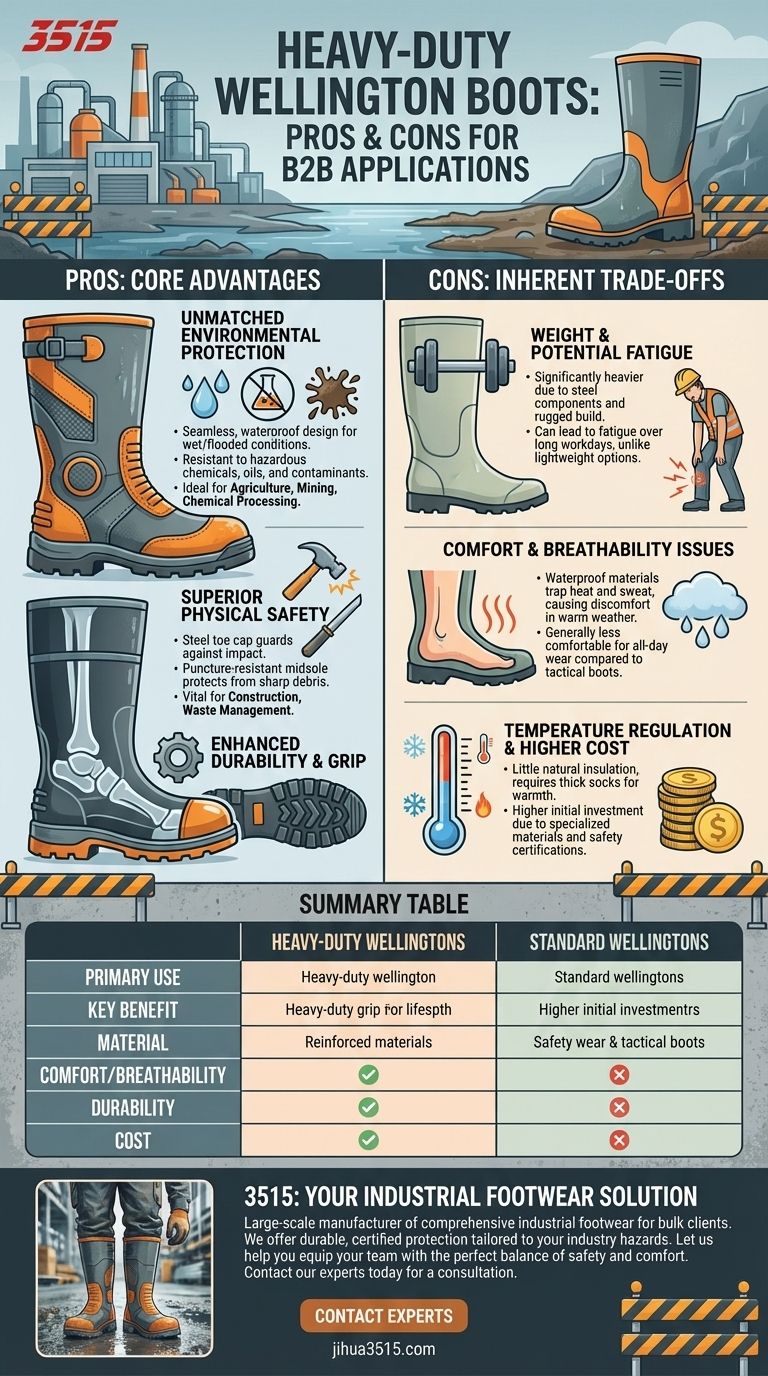
Related Products
- Safety Footwear Wholesale Manufacturer for Custom OEM/ODM Production
- Premium Flame-Retardant Waterproof Safety Boots and Shoes
- Premium Waterproof High-Cut Industrial Safety Boots for Wholesale and Bulk Orders
- Wholesale Premium Waterproof Nubuck Safety Shoes Boots
- Wholesale Safety Footwear Manufacturer for Bulk & Custom OEM Orders
People Also Ask
- What factors should be considered when selecting waterproof snow boots for men? A Technical Guide
- How do the heights of rain boots and snow boots compare? A Guide to Weather-Ready Footwear
- How did Wellington boots evolve after the Duke's death? From Aristocratic Fashion to Life-Saving Utility
- Why are wellies a good choice for gardening? Find Your Perfect Fit for Muddy Tasks
- What are the liner materials for rain boots? Cotton vs. Blends for Comfort & Durability
- Why is waterproofing important in gardening boots? Keep Your Feet Dry, Safe, and Comfortable
- What are the advantages of long boots/wellies in jungles? Essential Protection vs. Comfort
- What are the common parts of a wellington boot and their functions? A Guide to Boot Anatomy & Performance


